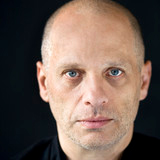David Lang
 Passionate, prolific, and complicated, composer David Lang embodies the restless spirit of invention. Lang is at the same time deeply versed in the classical tradition and committed to music that resists categorization, constantly creating new forms. In the words of The New Yorker, “With his winning of the Pulitzer Prize for the little match girl passion (one of the most original and moving scores of recent years), Lang, once a postminimalist enfant terrible, has solidified his standing as an American master.”
Passionate, prolific, and complicated, composer David Lang embodies the restless spirit of invention. Lang is at the same time deeply versed in the classical tradition and committed to music that resists categorization, constantly creating new forms. In the words of The New Yorker, “With his winning of the Pulitzer Prize for the little match girl passion (one of the most original and moving scores of recent years), Lang, once a postminimalist enfant terrible, has solidified his standing as an American master.”
Musical America’s 2013 Composer of the Year and recipient of Carnegie Hall’s Debs Composer’s Chair for 2013-2014, Lang is one of America’s most performed composers. Many of his works resemble each other only in the fierce intelligence and clarity of vision that inform their structures. His catalogue is extensive, and his opera, orchestra, chamber and solo works are by turns ominous, ethereal, urgent, hypnotic, unsettling and very emotionally direct. Much of his work seeks to expand the definition of virtuosity in music — even the deceptively simple pieces can be fiendishly difficult to play and require incredible concentration by musicians and audiences alike.
the little match girl passion, commissioned by Carnegie Hall for Paul Hillier’s vocal ensemble Theater of Voices, was awarded the 2008 Pulitzer Prize for music. Of the piece, Pulitzer-juror and Washington Post columnist Tim Page said, “I don’t think I’ve ever been so moved by a new, and largely unheralded, composition as I was by David Lang’s the little match girl passion, which is unlike any music I know.”
Some of his most recent works include death speaks, a song cycle based on Schubert, but performed by rock musicians, including Bryce Dessner from The National and Shara Worden from My Brightest Diamond; man made, a concerto for the quartet So Percussion and the BBC orchestra; the whisper opera, for the International Contemporary Ensemble and soprano Tony Arnold; love fail, an evening-length work for the early music vocal ensemble Anonymous 4, with libretto and staging by Lang; reason to believe, for Trio Mediaeval and the Norwegian Radio Orchestra; concerto (world to come) for cellist Maya Beiser and the Norrlands Operans Symhoniorkester; writing on water for the London Sinfonietta, with libretto and visuals by English filmmaker Peter Greenaway; and the difficulty of crossing a field, a fully staged opera with the Kronos Quartet.
Lang’s works are performed around the globe by the BBC Symphony, the International Contemporary Ensemble, eighth blackbird, Santa Fe Opera, the New York Philharmonic, the Netherlands Chamber Choir, the Boston Symphony, the Munich Chamber Orchestra, the Kronos Quartet and many others; and at festivals and venues such as Lincoln Center, the Southbank Centre, Carnegie Hall, the Kennedy Center, the Barbican Centre, the Brooklyn Academy of Music, Tanglewood, the BBC Proms, MusicNOW festival, The Munich Biennale, the Settembre Musica Festival, the Sydney 2000 Olympic Arts Festival and the Almeida, Holland, Berlin, Adelaide and Strasbourg Festivals.
His music is used regularly for ballet and modern dance around the world by such choreographers as Twyla Tharp, the Paris Opera Ballet, the New York City Ballet, Susan Marshall, Edouard Lock, La La La Human Steps, The Netherlands Dance Theater, and Benjamin Millepied, who choreographed a new piece by Lang for the LA Dance Project at BAM in 2014.
Lang’s film work includes the score for Jonathan Parker’s (Untitled), the music for the award-winning documentary The Woodmans, and the string arrangements for Requiem for a Dream, performed by the Kronos Quartet. His music is also on the soundtrack for Paolo Sorrentino’s Oscar-winning La Grande Bellezza and the director’s upcoming film, Youth.
Lang is the recipient of numerous honors and awards, including the Pulitzer Prize, Musical America’s Composer of the Year, Carnegie Hall’s Debs Composer’s Chair, the Rome Prize, the BMW Music-Theater Prize (Munich), and grants from the Guggenheim Foundation, the Foundation for Contemporary Performance Arts, the National Endowment for the Arts, the New York Foundation for the Arts, and the American Academy of Arts and Letters. In 1999, he received a Bessie Award for his music in choreographer Susan Marshall’s The Most Dangerous Room in the House, performed live by the Bang on a Can All-Stars at the Next Wave Festival of the Brooklyn Academy of Music. The Carbon Copy Building won the 2000 Village Voice OBIE Award for Best New American Work. The recording of the passing measures on Cantaloupe Records was named one of the best CDs of 2001 by The New Yorker. His CD pierced on Naxos was praised both on the rock music site Pitchfork and in the classical magazine Gramophone, and was called his “most exciting new work in years” by the San Francisco Chronicle. The recording of the little match girl passion released on Harmonia Mundi, received the 2010 Grammy Award for Best Small Ensemble Performance.
Lang is co-founder and co-artistic director of New York’s legendary music collective Bang on a Can. His work has been recorded on the Sony Classical, Harmonia Mundi, Teldec, BMG, Point, Chandos, Argo/Decca, and Cantaloupe labels, among others.
His music is published by Red Poppy Music (ASCAP) and is distributed worldwide by G. Schirmer, Inc.
